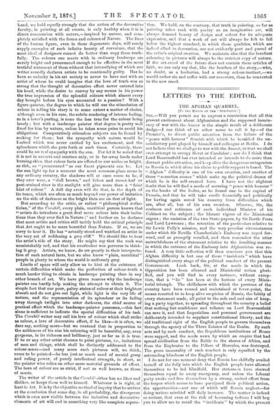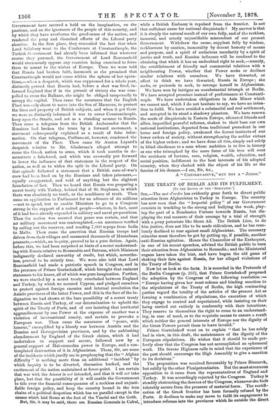LETTERS TO THE EDITOR.
THE AFGHAN QUARREL.
[TO TOG EDITOR Or TEM "SPECTATOR.")
S.112,-11111 you permit me to express a conviction that all this present excitement about Afghanistan and the supposed immin- ency of war with the Ameer is the simple result of a deliberate dodge—I can think of no other name to call it by—of the Premier's, to divert public attention from the failure of the "peace with honour" flourish with which he heralded the un- satisfactory part played by himself and colleague at Berlin. I do not believe that we shall go to war with the Attlee:, or that we shall even attempt to occupy Herat or Candahar ; nor do I think that Lord Beaconsfield has ever intended or intends to do more than distract public attention, and keep alive the dangerous antagonism to Russia in which alone his claim to public support is based. The "Afghan" difficulty is one of his own creation, and another of those "sensation scenes" which make up the political drama of which he is the self-created hero. I have not the slightest doubt that he will find a mode of securing "peace with honour" on the banks of the Indus, as he found one in the capital of Prussia, and that he will take credit financially and politically for having again saved his country from difficulties which are, after all, but of his own creation. Observe, Sir, the coolness and reticence of each individual Minister of his Cabinet on the subject ; the blatant vigour of the Ministerial organs ; the emission of the two State-papers, by Sir Bartle Frere and Lord Lawrence ; the retention of the particulars relative to Sir Lewis Pelly's mission, and the very peculiar circumstances under which Sir Neville Chamberlain's Embassy was urged for- ward, and as promptly recalled, and then remember the utter untruthfulness of the statement relative to the insulting manner in which the entrance of the Embassy into Afghauistan was re- fused. A very little reflection will then convince you that this Afghan difficulty is but one of those " incidents " which have distinguished every stage of the political conduct of the present Government. Look back, Sir, at the mode in which the Opposition has been silenced and Ministerial action glori- fied, and you will find in every instance, without excep- tion, that a " lie " has been at the bottom of every Minis- terial triumph. The skilfulness with which the passions of the country have been roused and maintained at fever-point, the means resorted to to keep alive suspicion of Russia, the falsity of every statement made, all point to the sole end and aim of keep. ing a party together, to spreading throughout the country a belief that nothing but confidence and reliance on Lord Beaconsfield can save it, and that Imperialism and personal government are deliberately intended to supplant constitutional liberty, and the old traditional right of the English people to govern themselves through the agency of the Three Estates of the Realm. By such acts and by such conduct, the Republican institutions of Rome were sapped, and the seeds sown by which an empire that had spread civilisation from the Baltic to the shores of Africa, and from the Euphrates to the Pillars of Hercules, was destroyed. The gross immorality of such conduct is only equalled by the astounding blindness of the English people.
I do not for one moment deny that Russia has skilfully availed herself of the folly into which the English people have allowed themselves to be led blindfold. Her statesmen have showed themselves equal to every emergency, and unless the Liberal party awake and free themselves by a strong, united effort from the torpor which seems to have paralysed their political action, the opportunities—not one of which will Russia neglect—for doing serious mischief will daily increase. The matter is indeed so serious, that even at the risk of becoming tedious I will beg you to allow me to recall the "incidents" by which the present
Government have secured a hold on the imagination, on the passions, and on the ignorance of the people of this country, and by which they have overborne the good-sense of the nation, and rendered the puny and disunited efforts of the Liberal party abortive. In the first place, they concealed the fact that when Lord Salisbury went to the Conference at Constantinople, the Turkish Government had already been informed that whatever course they pursued, the Government of Lord Beaconsfield would strenuously oppose any coercion being exercised to force them to assent to the wishes of Europe. Then we were told that Russia had broken faith, inasmuch as she promised that Constantinople would not come within the sphere of her opera- tions,—when a despatch, which was suppressed for a whole year, distinctly proved that Russia had, before a shot was fired, in- formed England that if in the pursuit of victory she was com- pelled to cross the Balkans, she might be obliged temporarily to occupy the capital. Then came the assurance that the English Fleet was only about to move into the Sea of Marmora, to protect the lives and property of British subjects, and when it got there we were as distinctly informed it was to cover Constantinople, keep open the Straits, and act as a standing menace to Russia. Then came a telegram from the British Ambassador that the Russians had broken the truce by a forward movement, a statement subsequently explained as a result of false infor- mation. On that telegram, Parliament, however, condoned the movement 'of the Fleet. Then came Sir Austen Layard's despatch relative to Mr. Gladstone's alleged attempt to rouse the Creek nation to arms, which it took months to de- monstrate a falsehood, and which was avowedly put forward to lower the influence of that statesman in the respect of the nation, as well as to widen the split in the Liberal party. On that episode followed a statement that a British man-of-war's crew had been fired on by the Russians and taken prisoners,— equally exaggerated, and void of anything but the slightest foundation of fact. Then we heard that Russia was preparing a secret treaty with Turkey, behind that of St. Stephan°, in which there was absolutely no truth, or the semblance of truth. Then came an application to Parliament for an advance of six millions —not to spend, but to enable Ministers to go to a Congress strong in the support of a united people—whereas, in fact, most of it had been already expended in military and naval preparations. Then the nation was assured that peace was certain, and that no military movement was contemplated,—an assurance verified by calling out the reserves, and sending 7,000 sepoys from India to Malta. Then came the assertion that Russian troops had driven from their villages and massacred thousands of Mussulman peasants,—which, on inquiry, proved to be a pure fiction. Again, before this, we had been surprised at hints of a secret understand- ing with Russia relative to Bessarabia and Batoum, which Ministers indignantly declared unworthy of credit, but which, neverthe- less, proved to be strictly true. We were also told that Lord Beaconsfield had made a patriotic speech in Congress, and in the presence of Prince Gortschakoff, which brought that eminent statesman to his knees, all of which was pure imagination. Further, we were startled by a secret treaty concluded between England and Turkey, by which we secured Cyprus, and pledged ourselves to protect against foreign enemies and internal revolution the Asiatic provinces of the latter Power, and this in the face of the in- dignation we had shown at the bare possibility of a secret treaty between Russia and Turkey, of our determination to uphold the spirit of the Treaty of Paris, and of our insisting that territorial aggrandisement by one Power at the expense of another was a violation of international comity, and certain to provoke a European war. Then came the assurance of "peace, with honour," exemplified by a bloody war between Austria and the Bosnian and llerzegovinian provinces, and by the unblushing abandonment by England of the Greek claims, which it had undertaken to support and secure, followed now by a general support of Mahommedan power in Europe, and a con- templated destruction of it in Afghanistan. These, Sir, are some of the incidents which justify me in prophesying that the " Afghan difficulty" is nothing more than an additional " incident " by which inquiry is to be diverted, discussion burked, and the excitement of the nation maintained at fever-point. I am certain that war with the Ameer is not intended, and that it will not take place, but that the possibility of it will enable the Government to tide over the financial consequences of a reckless and unjusti- fiable foreign policy, and keep the country bound in the iron chains of a political despotism which has no parallel except in the causes which laid Rome at the feet of the Vandal and the Goth.
But, Sir, it may be said, there are Russian Generals in Cabal,
' while a British Embassy is repulsed from the frontier. Is not that sufficient cause for national disquietude ? My answer is that it is simply the natural result of our own folly, and of the reckless, immoral, and utterly unjustifiable misconduct of our present Government. Withdraw the cause, supplant folly by wisdom, recklessness by caution, immorality by decent honesty of means and purpose, and a spirit of audacious mendacity by a spirit of justice and truth, and Russian influence will be confined to the obtaining that which it has an undoubted right to seek,—namely, the establishment of friendly and commercial relations with a neighbouring Power, whether that Power seeks or declines similar relations with ourselves. We have thwarted, or affect to think we have thwarted, Russia in Europe ; she seeks, or pretends to seek, to revenge herself in Afghanistan.
We have won by intrigue an unsubstantial triumph at Berlin. We have accepted promises instead of performance at Constanti- nople. We have undertaken obligations in Asia Minor which we cannot and, which I do not hesitate to say, we have no inten- tion to fulfil. We have avoided a substantial and real settlement, and accepted in its stead a shadowy phantom. We have resown the seeds of disquietude in Eastern Europe, alienated friends and allies, imperilled peaceful reforms, shaken to their base our own national institutions, departed from traditional precedent in our home and foreign policy, awakened the fiercer instincts of our lower orders of society, without strengthening the nobler virtues of the higher orders ; and we have done all this, simply and solely in blind obedience to a man whose ambition is to live in history as one who triumphed by the mere force of his iron will over the accidents of fortune, race, religion, wealth, education, and social position, indifferent to the best interests of his adopted country, when they clashed with the object of his life or the fancies of his dreams.—I am, Sir, &c.,
A "CONSERVATIVE," BUT NOT A "JINGO."



































 Previous page
Previous page